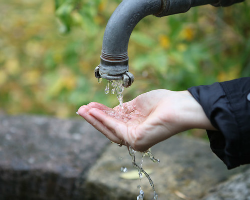Monaco’s sustainable resilience approach to climate change

WHO/Charles Ndwiga
As a Mediterranean country, Monaco faces periods of drought as a result of climate change. The Government has, therefore, introduced policy on the management of sustainable water resources at the core of which is an approach, combining intersectoral resilience-oriented action and the ecological maintenance of green public spaces.
Monaco, with 40 000 inhabitants living in an area of 2 km2, is the most densely populated country in Europe and it is exclusively urban. Safe water and sanitation are essential to creating resilient communities and promoting health and well-being in the country.
Monaco views the United Nations 2030 Agenda for Sustainable Development as an opportunity to develop new avenues of cooperation through a multisectoral approach. The Government is working parallelly towards achieving Sustainable Development Goal (SDG) 6 – ensure availability and sustainable management of water and sanitation for all – and SDG 13 – action to counteract climate change by:
- including measures to curb water demand and redistribute water resources in Monaco’s climate-resilience policy, which has already resulted in a 15% reduction in water consumption since the year 2000;
- controlling water pollution – and thus waterborne diseases – through strict preventive procedures and the collection of specific industrial waste and industrial wastewater;
- maintaining an ecological balance in public gardens and parks, using an optimization system (night watering, watering schedule based on rainfall) defined by the services in charge of urban development, and limiting the use of chemical insecticides as far as possible (the Government promotes both the use of organic options (ladybirds) and integrated pest-management approaches).
As stated by His Excellency Mr Serge Telle, Prime Minister of the Principality of Monaco, at the 8th World Water Forum (Brazil, March 2018): “Water management enables humankind to live in an environment sheltered from droughts and floods. Sanitation improves life expectancy of populations and irrigation enables the development of agriculture”.
In endorsing the “Iceland Statement. Ensuring safe and climate-resilient water and sanitation” during the Fifth high-level meeting of small countries: working together for better health and well-being for all (Rejkyavik, Iceland, June 2018), the participants in the Small Countries Initiative committed themselves to enhancing intersectoral and multilateral cooperation and coordination in this field, as well as to supporting each other.in achieving their goals.



